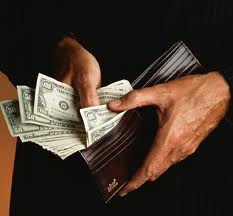
When I was young, money was real.
I couldn’t get a ham and cheese sandwich for a nickel or anything like that, but I could use the 2 dollars I’d been saving to buy a pack of cards from the game shop or my favorite candy for 50 cents. When my dad took us kids out to eat, his wallet held $20s, $10s, and $5s for him to use in exchange for the delicious food.
And when my mom exchanged a check for groceries it was always taken. Businesses knew a bank stood behind that check, and each bank held a vault full of real dollar bills to pay the check with.
But that isn’t the world we live in anymore.
Very few of us actually use real money. Everything we spend is digital.
If you use a bank, a debit card, or anything similar your money is no more than numbers on a spreadsheet – we don’t even use ink anymore.
When I buy food for my family, instead of cash, the restaurant gets a card that takes numbers off of my spreadsheet and transfers it to theirs. It isn’t real, but it’s how we do business.
What Happened?
Why has money gone digital? The answer is multi-faceted and complex but the simple version boils down to three reasons:
- Digital money is cheaper. Having someone count out every dollar in the bank is more expensive than having a computer keep track of a large spreadsheet. Fewer employees, fewer mistakes, and significantly less overhead. Banks are happy.
- Digital money is convenient. I log into a website and know immediately how much money I have – no more digging up a shoebox and counting what’s inside. Plus, when I want to buy something, I pull out a card that does all the work for me. No more counting change, knowing the right denomination of bill to use, etc. I am happy.
- It makes us spend more. Real money makes me pause when I see my wallet start to shrink. Do I really want to spend this money? It also stops me from spending money I don’t have. An empty wallet means I can’t buy stuff. Digital money takes away those limitations, keeping me ignorant of overspending. Banks and businesses are very happy.
Cheaper, convenience, and overspending are the driving forces in the money shift. Fewer people are using cash than ever and spending is skyrocketing – even during a so called recession.
Find A Balance
Going from real money to digital money isn’t a big deal. Like anything, there are benefits and disadvantages to both. As someone who uses money, it’s your responsibility to both be aware of the change and to find the right balance between digital and real money.
Why a balance? Because real cash helps you put a reign on spending while digital cash simplifies money management. You need both to grow wealth and thrive financially.
Do you use real money or have you gone completely digital?
When was the last time you wrote a check?
Alex Humphrey is a personal finance writer and coach at EntrepreLife a personal finance blog that teaches easy ways to dominate money by dropping debt, investing well, and saving for the things you love to do. When he’s not blogging he leads a youth group, spends time with his wife, and figures out new ways to teach people personal finances. You can follow him on Twitter and Facebook and subscribe to the EntrepreLife mailing list.
Leave a Reply